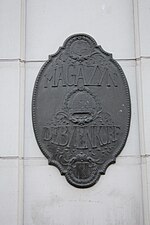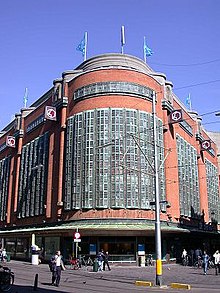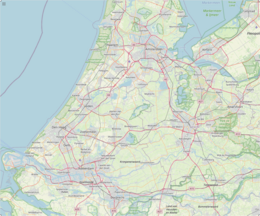De Bijenkorf
You can help expand this article with text translated from the corresponding article in Dutch. (January 2024) Click [show] for important translation instructions.
|
| Company type | Private |
|---|---|
| Industry | Retail |
| Genre | Department stores |
| Founded | 1870 |
| Headquarters | Amsterdam, Netherlands |
| Products | Clothing, footwear, bedding, furniture, jewelry, beauty products, house wares |
| Parent | Selfridges Group |
| Website | www |



De Bijenkorf (Dutch pronunciation: [də ˈbɛi.ə(ŋ)kɔr(ə)f]; literally, "the beehive"[1]) is a chain of high-end department stores in the Netherlands, with its flagship store on Dam Square in Amsterdam. The chain is owned by Selfridges Group, owner also of Britain's Selfridges and Ireland's Brown Thomas and Arnotts.
It has been a member of the International Association of Department Stores from 1929 to 2012,[2] with various CEOs acting as presidents of the Association over time.[3][4]
History
[edit]De Bijenkorf was founded in 1870 by Simon Philip Goudsmit (1845-1889), starting as a small haberdashery shop at 132 Nieuwendijk, one of Amsterdam's oldest streets and to this day a main shopping street. Initially limited to yarn and ribbons, and employing a staff of four, the stock expanded gradually. After the death of Goudsmit in 1889, Goudsmit's widow expanded the business with the help of a cousin, Arthur Isaac, and her son Alfred, eventually buying adjacent buildings.
In 1909, these connecting shops were replaced by a new building. That same year, a temporary building was erected on the site of the demolished Beurs van Zocher, and construction of a new store started beside it.

In 1926, a second store was built in The Hague, designed by Piet Kramer, a notable example of Amsterdam School architecture.
A third store opened in Rotterdam in 1930, designed by renowned architect Willem Dudok. Some 700,000 people attended the opening festivities.
Toll of German occupation
[edit]The Rotterdam store was heavily damaged in the German bombing of Rotterdam of 1940 after Nazi Germany invaded (and preceded the occupation of the country 1940-1945), which resulted in the near-total destruction of the city's historic centre. The intact part of the store remained open for business until 1957, but was cleared in 1960 to build the Rotterdam Metro. A new store was designed by Hungarian-American architect Marcel Breuer (1902–1981).
After the invasion, the authorities confiscated the shares of the Jewish owners and German company Riensch & Held took them over.[5] In November 1943, German businessman Herbert Tengelmann was placed on the Board as Wehrwirtschaftsführer.[6] Of the 5000 employees in May 1940 around 1000 were of Jewish origin and of those 737 were murdered by the Nazis. The owners Isaac hid and Alfred Goudsmit escaped to the United States.[7] The Jewish Dutch owners were able to reclaim their property after the liberation of 1945.[8]
Post-war
[edit]Ownership of De Bijenkorf
[edit]| Year | Group | Remarks | ||
|---|---|---|---|---|
| Part of | Owner | |||
| Company | Nationality | |||
| 1966[9] | Koninklijke Bijenkorf Beheer (KBB)(nl) | Dutch | ||
| 1999 | Vendex KBB NV[10] | Dutch | Merger of KBB and Vroom en Dreesman; also owned HEMA.[11] | |
| 2004 | Vendex KBB NV | VDXK Acquisition BV, in turn owned by KKR, AlpInvest Partners, and Change Capital Partners | American, Dutch |
Maxeda paid EUR 2.4 billion for Vendex KBB, took it off the stock exchange and in 2006 merged it into Maxeda, selling HEMA for 1.3 bn euro to Lion Capital and retiring the Vendex KBB name.[12] Maxeda was owned by Kohlberg Kravis Roberts (KKR) & Co. (USA) and AlpInvest Partners (Netherlands). It owned V&D, La Place, De Bijenkorf, Hunkemöller, and MS Mode (then called M&S Mode), which is sold for a total of EUR 4 billion.[13] |
| 2004 | Koninklijke Vendex KBB BV | |||
| 2004 | Vendex KBB BV | |||
| 2006 | Maxeda | |||
| 2011 | Selfridges Group Ltd.[13] | British | Also owned Selfridges (UK), Brown Thomas and Arnott's (Ireland) Holt Renfrew and Ogilvy (Canada) | |
| 2022 | Selfridges Group Ltd. | Central Group/Signa Holding | Thai, Austrian |
Also acquired Selfridge's (4 stores), Brown Thomas (6 stores), and Arnott's. Already owned KaDeWe (Germany–Berlin), Globus (Switzerland) and La Rinascente (Italy).[14] |
Stores
[edit]As of 2014, De Bijenkorf has 7 stores nationwide. The oldest and largest branches, situated in Amsterdam, The Hague and Rotterdam, have retail space ranging between 15,000 and 21,000 square meters. Smaller stores (7,500–10,000 m2 of retail space) can be found in Amstelveen, Eindhoven, Utrecht and Maastricht.
Branches in Arnhem, Groningen, Enschede, Breda and Den Bosch closed in late 2014/early 2015 as the parent group decided to focus up-market and online due to the new premium service strategy. The Arnhem building was taken over by Primark, a move seen by many Arnhemers as drastically reducing the attractiveness of Arnhem as a shopping centre.
Bijenkorf Wonen was a store format that carried home furnishings such as bath and bed linens, housewares, kitchen appliances, dishware, glassware, decorative accessories, et al.
Table of store locations
[edit]
| City | Street or mall | Format | Opened | Closed | Current tenant |
|---|---|---|---|---|---|
| Amsterdam | Dam | Full-line | 1870 | in operation | |
| The Hague | Wagenstraat | Full-line | 1926 | in operation | |
| Rotterdam (1930–1957) |
Van Hoogendorpplein (now Churchillplein) | Full-line | October 16, 1930 | March 13, 1957 | |
| Rotterdam (1957–present) |
Coolsingel | Full-line | 1957 | in operation | |
| Eindhoven | Piazza Center | Full-line | 1969 | in operation | |
| Utrecht | Full-line | 1977/87 | in operation | ||
| Amstelveen | Stadshart Amstelveen | Full-line | 1998 | in operation | |
| Maastricht | Full-line | 2003 | in operation | ||
| Arnhem | Ketelstraat | Full-line | 1975 | 2013 | Primark |
| Enschede | Full-line | 2002 | 2013 | Primark | |
| Breda | Apparel | 2001 | 2016 | Zara | |
| Groningen | Apparel | 2001 | 2016 | Zara | |
| Den Bosch | Apparel | 2001 | 2016 | The Sting Companies | |
| Arnhem | Wonen | 1970s | 1980s | ||
| Utrecht | Wonen | 1977 | 1987 | ||
| Haarlem | Wonen | 1986 | closed | ||
| Venlo | Outlet | 2005 | 2008 | ||
| Lelystad | Batavia Stad | Outlet | before 2006 | closed | |
References
[edit]- ^ Martin Dunford (2010). The Rough Guide to the Netherlands. Penguin. pp. 62–63. ISBN 978-1-84836-882-8.
- ^ De Bijenkorf official website. "Histoire". de Bijenkorf. Archived from the original on 2020-11-26.
- ^ "IADS Presidents". www.iads.org. Retrieved 2021-04-22.
- ^ "News releases - www.stockmanngroup.com". www.stockmanngroup.com. Retrieved 2021-06-20.
- ^ De oorlogsjaren ("The War Years"), Joods Erfgoed Den Haag ("The Hague Jewish Heritage")
- ^ Christoph Kreutzmüller, Händler und Handlungsgehilfen : der Finanzplatz Amsterdam und die deutschen Großbanken (1918–1945). Steiner, Stuttgart 2005, ISBN 3-515-08639-0.
- ^ De oorlogsjaren ("The war years"), Joods Erfgoed Den Haag ("The Hague Jewish Heritage")
- ^ Herstel na de Tweede Wereldoorlog ("Re-establishment after the Second World War"), Joods Erfgoed Den Haag ("The Hague Jewish Heritage")
- ^ "Inventarissen: 929 Archief van de Koninklijke Bijenkorf Beheer N.V. en rechtsvoorgangers" [Archive of KBB and Predecessors]. Archief Amsterdam (Amsterdam Municipal Archives) (in Dutch). 2009. Retrieved 8 January 2024.
- ^ "Vendex toys with FAO Schwarz sale - Apr. 14, 1999". money.cnn.com. 14 April 1999. Retrieved 8 January 2024.
- ^ "Distressed debt funds take an interest in Maxeda". RetailDetail EU. 19 May 2016. Retrieved 8 January 2024.
- ^ "Dutch Maxeda sells Hema retail chain to Lion Capital". Reuters. 9 August 2007. Retrieved 8 January 2024.
- ^ a b "Maxeda concludes strategic review of Fashion Group - Permira". yumpu.com. Maxeda. 31 January 2011. Retrieved 8 January 2024.
- ^ "Overname moederbedrijf de Bijenkorf afgerond - RetailTrends" [Acquisition of parent company de Bijenkorf completed]. RetailTrends (in Dutch). 19 August 2022. Retrieved 8 January 2024.
External links
[edit]![]() Media related to De Bijenkorf at Wikimedia Commons
Media related to De Bijenkorf at Wikimedia Commons


